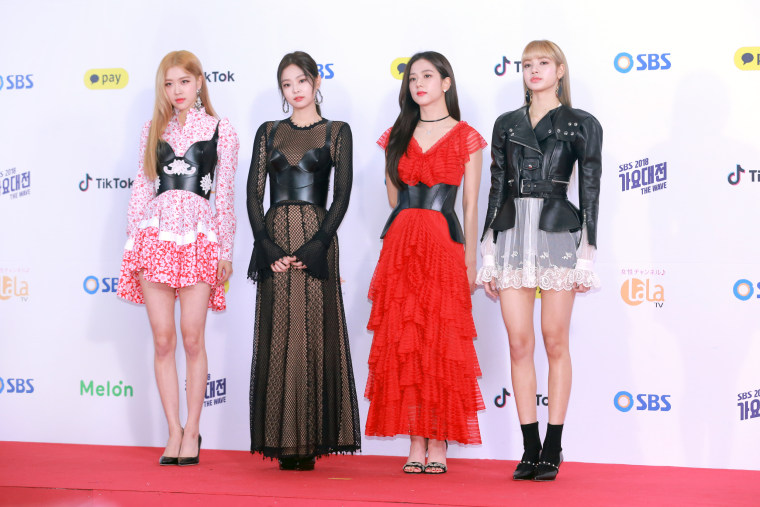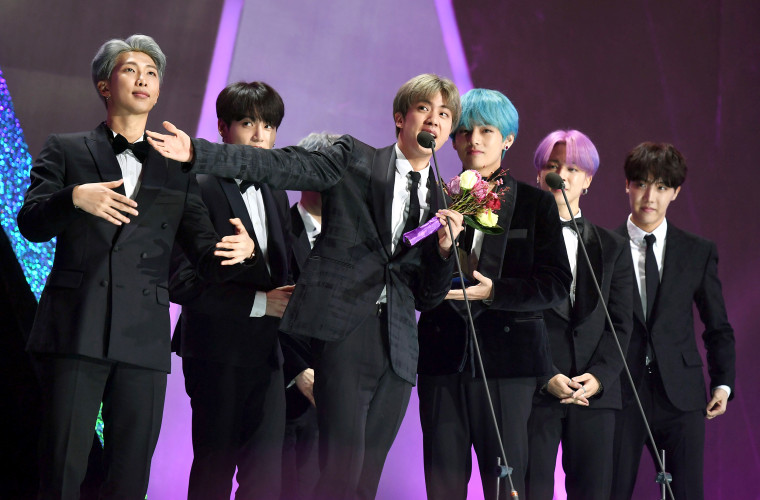This summer, fans of South Korean group BTS will be able to bring facsimiles of the seven members into their homes with a new line from American toy-maker Mattel. Announced shortly after the new year, it is one of the more prominent collaborations between a Western company and a K-pop act – and it’s expected to be far from the last one as K-pop continues to gain a foothold internationally.
With widespread interest has come more opportunities for merchandising collaborations, which already have a long history in K-pop (the catchall term for the music, stars, and related entities coming out of South Korea’s youth-oriented pop industry). After gaining popularity in Asia during the ‘90s and ‘00s, artists based out of South Korea began to rapidly gain prominence in the West during the end of the ‘00s and ‘10s with the advent of YouTube.
2018 was a breakout year for the K-pop industry, with BTS landing atop of the Billboard 200 album chart on two occasions and numerous other acts – most notably, female quartet BLACKPINK – also making their mark on Billboard’s main stateside charts.
Those accolades, fueled by fans, have opened the door for more K-pop-associated merchandise in the U.S. through local partnerships and collaborations, although it isn’t a new avenue for K-pop stars in general.

Western brands have dabbled with K-pop collaborations minimally in the past, like France’s LVMH investing in Big Bang and BLACKPINK’s label YG Entertainment in 2014 and Monster, the California-based company that produced early models of Beats by Dr. Dre, launching a headphone line with JYP Entertainment, currently home to the likes of TWICE and GOT7, in 2012. Globally, for years, groups have advertised everything from smartphones to water filters. Apparel and product sponsorship are widespread as the industry heavily relies on lucrative advertisements to fund its artists' careers.
But as impactful as stars are as spokespeople and influencers, there is a deep-rooted history among music fandoms to own items that directly are affiliated with, and often produced by, their favorite stars. Grown partially out of how concert t-shirts, most prominently Metallica, were used during the heydays of rock and metal to serve as identifiers among fans, modern day music merchandising is a lucrative form of spreading an artist’s brand identity.
Case in point: the day after Mattel announced its BTS collaboration, the company’s stock spiked almost 9 percent – a change from its recent performance in the market – as interest from BTS fans showed promise for an upcoming lucrative product launch.
“BTS is a pop-culture phenomenon that is leading the K-pop movement with a fan following that transcends age, culture and language,” Janet Hsu, Mattel’s chief franchise management officer and head of the company’s Global Franchise Management division, said. “Though we expected global interest, the excitement and anticipation around the collection has far exceeded those expectations.”
While Mattel will bring fans the first BTS toy line, the septet has been busy over the last year with a sneaker collaboration with Puma, as well as a collaboration with messaging app LINE on the Line Friends character line BT21, which was simultaneously launched at the company’s Times Square and Seoul locations. A recent Line Friends pop-up store in Los Angeles brought thousands to Hollywood.
BT21 products have also become popular at retailers like Hot Topic, which has become a purveyor of K-pop concert tees and other related goods – a demand Ed Labay, Hot Topic’s vice president of general merchandise marketing, said wasn’t a top-down decision; it came directly from customer requests.
“Our fans demanded it from us,” said Labay. “The passion they bring for this genre of music is incredible, and as a destination for music and pop-culture, it made perfect sense for us to be the home for it.”
And while they’re not collaborating directly – yet – many retailers in the States have also begun to lean into K-pop merchandising, with the likes of Barnes & Noble and Amazon providing fans access to albums and official products that were previously only accessible through certain K-pop-oriented retailers at an immense markup. Additionally, digital clothing brand Represent, based out of both the States and Prague, increasingly provides access to “official merchandise by influencers, celebrities and independent artists,” including Ed Sheeran and Leonardo DiCaprio, and is increasingly working with Korean stars, like YG Entertainment’s WINNER, GOT7’s Mark Tuan, and actor-singer Lee Joon-gi. And last year, SM Entertainment granted a licensing agreement to a local partner known as Urban Coconut to operate the SM Global Shop so that stateside fans could purchase the company’s goods from a verified source rather than alternative outlets.
As K-pop continues to soar in the U.S., the opportunities for more merchandising and bigger stages will continue to grow. Recently, BLACKPINK made history with the announcement they will play Coachella in April, making them the first K-pop girl group to perform at the popular festival – showing that interest from audiences in the States isn’t going anywhere.
“[K-pop] continues to grow as more groups become known in the U.S. market,” Hot Topic’s Labay said. “We look forward to launching more product in the future.”
Follow NBC Asian America on Facebook, Twitter, Instagram and Tumblr.


